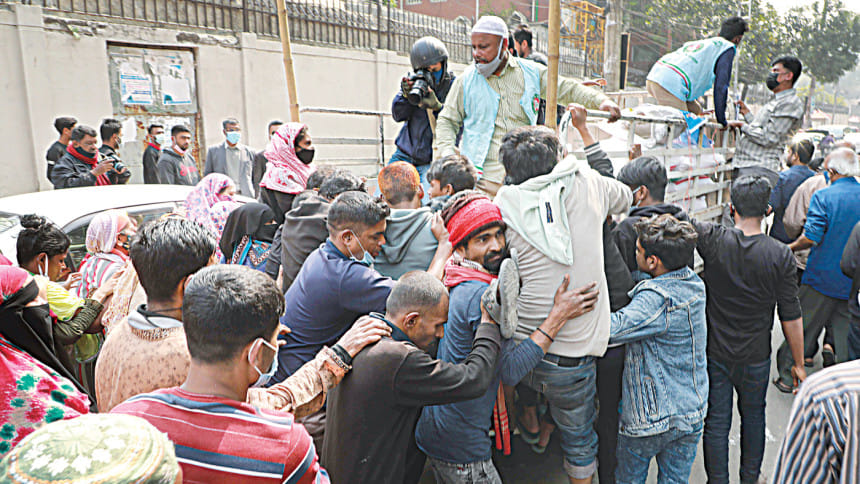Limited-income families: Neck-deep in maladies

Before the pandemic, Mujibur Rahman, a private firm employee, could provide for his family of four. He could pay for the education of his three children, make rent and even save something for a rainy day.
But in 2020, he lost his "permanent" job during the shutdown. He eventually managed a temporary job. But his struggle to make ends meet is getting tougher because of the soaring prices of essentials.
"I have to borrow about Tk 5,000 to Tk 6,000 every month. I repay those when I get my salary. But by the end of the month I am in debt again," he said.
In his old job, he used to make Tk 39,000 a month while his current salary is Tk 21,000 only.
"From transport costs to prices of essentials, I have to spend more for everything," he said, adding that he had to reduce consumption to cope.
Like him, most of the middle- and low-income people across the country are being forced to compromise on standard of living.
Contacted, Towfiqul Islam Khan, senior research fellow at the Centre for Policy Dialogue, said edible oil and several other essentials are imported and the prices of such goods have to be set in accordance with the global prices. But the prices of locally produced goods should not increase.
The global market is quite uncertain because the recovery from the pandemic has been shaky and there is growing uncertainty over the Russia-Ukraine situation. The Bangladesh government should take a long-term approach, he said.
The government should make policies, taking into account that the limited income people are now under tremendous pressure.
"The utility sector has governance issues and system losses. Before addressing these problems, if the government withdraws the subsidies, the burden will be on the consumers," he said.
The ministries of agriculture, food, commerce, finance, power and energy should come together to evaluate the situation and take adequate measures. But that is not happening because of a leadership vacuum.
According to the Bangladesh Bureau of Statistics (BBS), point-to-point inflation rose to 6.05 percent in December 2021 compared to 5.29 percent in December 2020. Food inflation went up to 5.46 percent in December 2021, as opposed to 5.34 percent in December 2020.
Non-food inflation has been unbridled since the government hiked diesel and kerosene prices in the first week of November last year, reaching 7 percent in December, a six-year high.
While the increased fuel prices are draining people's pockets further, there are talks of further increasing utility costs for households.
Experts warn that these increased prices will eventually affect the market of daily essentials and will take a toll on the middle-income people.
"A gourd used to cost Tk 50 in winter a couple of years ago. Now it is Tk 80-90. A bundle of spinach used to cost less than Tk 10, now it is over Tk 15," said Habibullah Bahar, a resident of Shantinagar in the capital.
At several kitchen markets in the capital, these correspondents found that the average prices of pumpkin, cauliflower, cabbage, papaya, green bean, gourd, cucumber, brinjal, radish, carrot, tomato and pea have risen by 61.6 percent from the prices mentioned by the Department of Agriculture Marketing in 2019.
Rising fuel prices have made shipping more expensive and this affected the kitchen markets.
A litre of soybean oil used to cost Tk 88 in 2019. The price has almost doubled with increases in multiple phases.
Each kg of beef and mutton now sells for Tk 600 and Tk 900 respectively, up from Tk 550 and Tk 750 two years ago.
Pangas, ruhi, tilapia fish and shrimps have also become costlier.
Despite bumper harvest of paddy, rice is costlier too.
Between 2020 and 2022, the price of coarse and fine Boro rice has increased to Tk 45 and Tk 65 from Tk 34 and Tk 54. The price of flour has also increased by Tk 10 per kg to Tk 43.
Contacted, former director general of the Department of Agriculture Marketing (DAM) Mohammad Yusuf said the actual rice production was lower than the government estimation. "Many big companies are now selling packs of rice. To be able to do this, they store rice, contributing to the rise in prices."
He added that the demand for rice has gone up more than the production has increased over the years, he said, adding that that's why the price does not fall.
Noted economist Ahsan H Mansur, executive director at the Policy Research Institute of Bangladesh, said at first, there was a price hike of commodities in the global market. As a result, consumer goods became costlier.
Amid rising cost of living, rents go up and employees ask for raises. This eventually raises the cost of production, he said.

 For all latest news, follow The Daily Star's Google News channel.
For all latest news, follow The Daily Star's Google News channel. 



Comments